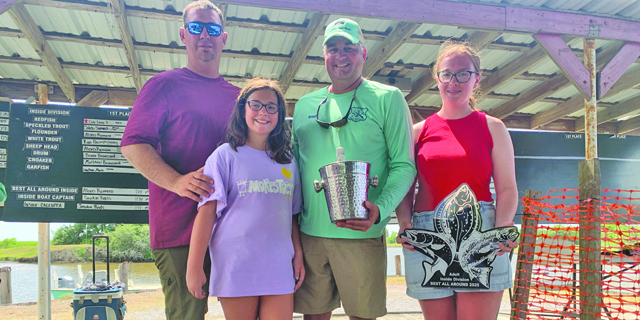‘Love of Week’s life’ could not wait for his proposal
Published 12:00 am Sunday, February 6, 2011
Back in the mid-1970s, I entered a six-year period of intensive research into the whimsical life of William Weeks Hall of the Shadows. Although the two biographies I wrote of Hall were well received, there was one phase of his life I yearned to explore even more – and that was his association with Fanny Craig Ventadour, a New Orleans socialite, who was touted as the “love of his life.”
Years later, by chance, I learned she was living in Winter Park, Fla., and was about to return to France where she was to be domiciled near her children. Fortunately, my wife and I arranged an appointment with her and on June 26, 1984, I succeeded in taping a two-hour interview of this fine lady. The tapes, which were stored in my desk drawer until recently, were transcribed for me by my daughter Rose Anne. I thought I would share some of this historic content with you.
Trending
I found Fanny to be a refined, pleasant, intellectual and talented person. I learned she was a native of Yazoo City, Miss. Her mother was a New Orleanian and her father was a cotton broker who operated along the Gulf Coast. She told me the grim story that her father committed suicide and that it was a “hush, hush, thing, and nobody knew why he did it.”
Apparently, the affection between Fanny and Weeks began in their childhood, at the time Weeks’ parents lived on Fourth Street in New Orleans. “He was a little boy,” she said, “and he’d come over and we’d swing in the swing on nights we were not having dancing school. We’d swing and talk and that’s when I got to know him very well. I thought he was interesting, but rather strange, because he was not like the other guys from the school who came over to swing with me.” As time wore on, she grew quite fond of Hall. She said Weeks was self-educated to a great degree, was intellectual, a wonderful speaker and a fine artist and art critic.
The couple enjoyed a delightful time during their early courtship. Family and friends gave gala parties and dinners in their honor in New Orleans and New Iberia. Fanny and Weeks mingled with prominent French Quarter writers and artists like Lyle Saxon, William Faulkner, William Spratling, Sherwood Anderson and others. In 1913, Weeks was awarded a scholarship to study painting at the Pennsylvania Academy of Arts in Philadelphia. While there he received another scholarship to study in Paris. He didn’t leave for Europe until 1920 because of World War I, and his mothers death in 1918. Incidentally, he gave Fanny his mother’s pearl necklace.
Fanny, who was interested in painting, followed in Weeks’ footsteps at the Pennsylvania Academy and also Paris.
“He (Weeks) paved the way for me, told me exactly what to do, who to see, who to meet,” she said, “and I met them all.”
She was elated to meet the famous painter Raphael Sabatini.
Trending
“He was a darling,” she said. She continued, “While at the academy, Weeks visited me often and we attended many studio parties.”
It was a romantic time for the two.
While in Paris, Fanny took a job as a photographer, and later met Jacques Ventador, a well-known French troubadour, who was a descendent of the prominent French line of Ventadors. They fell in love and an announcement of their engagement was published.
When Weeks received the news, he was shattered. Jacques and Fanny were the parents of Giles and Jacqueline and there were many grandchildren. Jacques died in 1936, and Fanny spent three years in France with her children. She returned to New Orleans to take an M.A. at Tulane University – she became an author and poet and wanted to be published in America.
After returning to New Orleans, she and Weeks again met and partied around. But a man by the name of Howard Southgate came into her life. He was a graduate of Carnegie Tech and director of the Little Theatre in New Orleans. They fell in love and married. He died in 1971. There were no children in this marriage.
I asked Fanny the personal pointed questions: “Were you in love with Weeks; did he love you; and did he ever propose marriage?”
Her answers were emphatic. “Yes,” she said, “I loved him, he loved me, but he never proposed to me.”
Earlier, when she told Weeks of her engagement to Southgate, she said, “He came over the following night with presents. These included a dance program from our childhood, a handkerchief, a faded rose, and other things I gave him. It was all so sad and sentimental. He was nice about it all.”
Weeks, however, became so depressed and downcast that he resorted to heavy drinking.
The consensus of many of Hall’s friends was that he hesitated marrying Fanny for fear they’d have to live in France and he’d lose sight of his precious mansion, the Shadows-on-the-Teche, which was also “The love of his life.” There’s a lot more of this interview which I did not publish, some of which is rather controversial. All of my Weeks Hall oriented tapes and transmissions will eventually be stored in the Shadows archives.
Fanny gave us a fine tour of her art possessions, presented us with a book of poems, we dined at a nearby restaurant, and Helen and I left the following morning with a good feeling that we made friends with a fine lady, and that our recorded visit was a contribution to Louisiana history.
n
Victoria Sullivan, a writer and botanist, has just published a science-fiction book titled “Adoption.” The story takes place in a mythical town in Acadiana called “Vermilion.” The mother of a 6-year-old girl dies suddenly, and the child is adopted by a neighborhood couple who are surprised that the girl becomes a giant – about 7 feet tall – this was the result of her mother’s in vitro fertilizing at a clinic.
How this all came about is a mystery to the adopters. Did something go wrong? Was it planned by doctors experimenting on humans? And if so, is it happening in the United States, Russia and Korea? The foster mother, who is a biology professor, becomes a detective and protector. She is well-versed in her research on the genetics of polyploid plants that have multiple sets of chromosomes which give her insights and sympathy for this super, but outnumbered new race of humans – a new race that is threatened by a fearful government and public, who want to eliminate them (and their differences) at any cost.
Victoria has the edge on most science-fiction writers in that she has a firm background in biology, a Ph.D at Florida State University, and has held a faculty position in the Department of Biology at the University of Louisiana at Lafayette for 20 years. Her exciting book is on sale at Books Along the Teche. Victoria divides her living time between New Iberia and Sewanee, Tenn.
Bye, bye.
MORRIS RAPHAEL is a local author and retired engineer.





